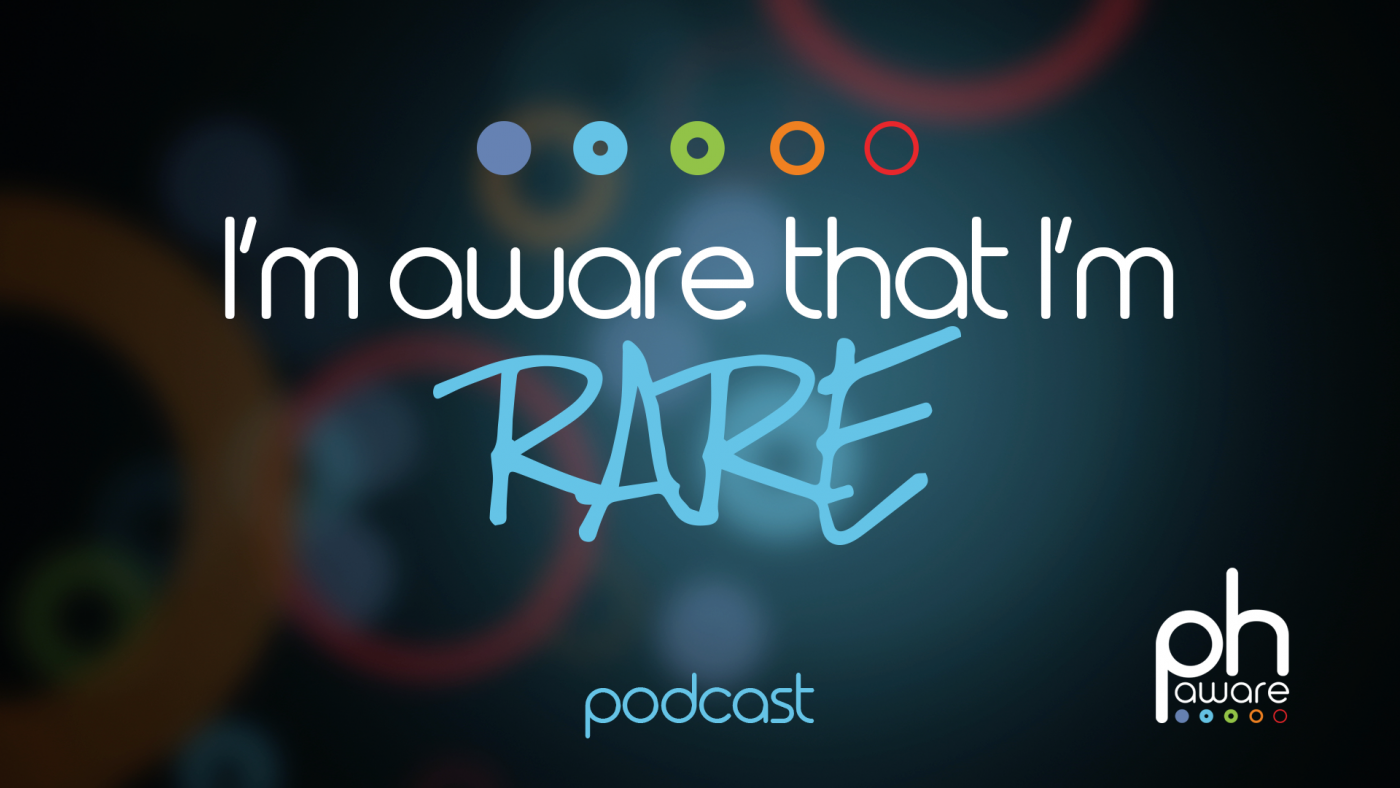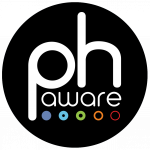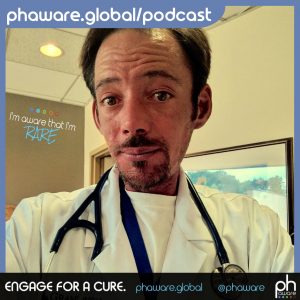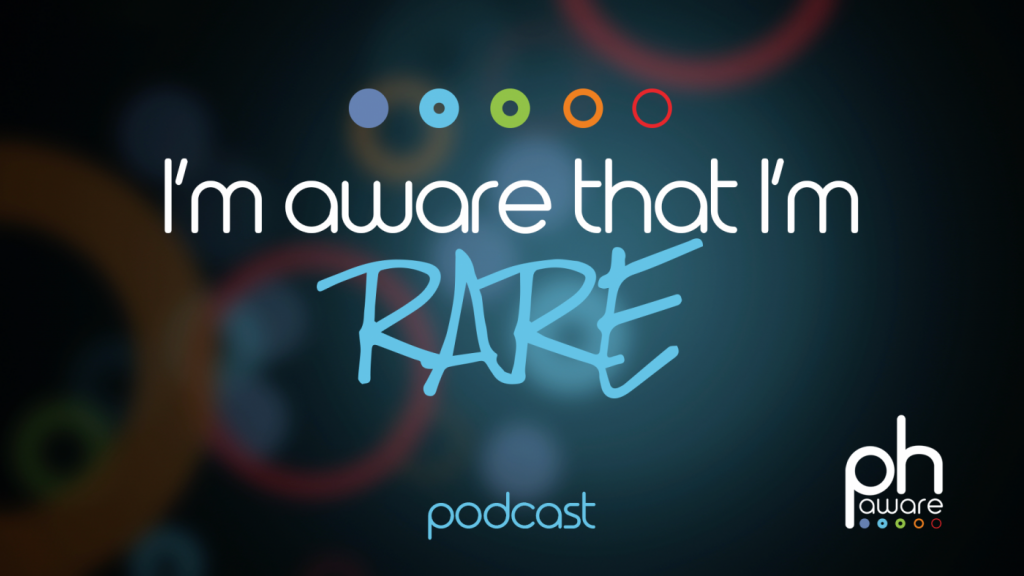Phaware Podcast: Sean Wyman
Written by |

This podcast series, created and produced by phaware, is being offered as a regular guest feature on Pulmonary Hypertension News to bring the voices and life experiences of PH patients, family members, caregivers, healthcare specialists, and others to our readers. You may listen to the podcast directly, or read it via the transcript that runs below.
I’m Aware That I’m Rare: Sean Wyman, DO, MSci
The phaware™ interview
Sean Wyman has lived with a pulmonary hypertension diagnosis for over 15 years. He has been an active voice in the PH community all that time. Sean has always worked to better support children who have the same disease. Having parents who are both teachers, Sean targeted awareness for children with PH through the cartoon series: Lips Painted Blue. Sean discusses his journey with PH and his road to overcoming health obstacles to becoming a medical professional.
My name is Sean Wyman and I’m a patient with pulmonary hypertension for the last almost 15 years.
I was diagnosed back in 2002. It was actually my 19th birthday present. I started to have symptoms probably a year and a half before I was  diagnosed, but I just thought it was because I was overweight and smoked. Ended up going on vacation with my mom and ended up in the hospital, and got fully worked up over the course of about a week. On my 19th birthday, exactly, the doctor walked in and said, “Well, I hate to tell you this, but you have pulmonary hypertension.”
diagnosed, but I just thought it was because I was overweight and smoked. Ended up going on vacation with my mom and ended up in the hospital, and got fully worked up over the course of about a week. On my 19th birthday, exactly, the doctor walked in and said, “Well, I hate to tell you this, but you have pulmonary hypertension.”
Relatively speaking, all things considered, I was probably diagnosed pretty early just because one, I was on vacation, and two, they had to figure out what was going on. Prior to that, I hadn’t gone to the hospital for shortness of breath or anything because I was young, dumb, and thought I knew what was the reason for my shortness of breath. Prior to that, I had never heard of pulmonary hypertension, and at the time, there were only two medications on the market. One was an IV medication. The other one was a brand new oral medication, and the only thing with any long-term data was the IV medication that was out there. So, I ended up going on that one.
The prognosis was I didn’t really have much of a choice. They didn’t know really how long someone could live with medication. They always gave you the, “Without medication,” “they” being doctors, “Without medication, you’re looking at 2.7 years. With medication, we really don’t know. There’s some people that have been around quite a while.” So I went with the medication that had the best data at the time and pretty much ensured someone would be around the longest.
I think some of the milestones early on was the addition of combination therapy that providers have started to do with oral medications, the different oral classes, and IV medications. At one point in time, I was able to temporarily come off of IV medications, which let me go back to swimming and all of that stuff. I’m looking forward to some of the other things like implantable pumps so that I can have a somewhat “normalish” life.
When I was initially diagnosed, I was diagnosed out of state. I was on vacation like I previously said. I came back to California and immediately, my doctors out here wanted to work me up for a transplant, so I went to UCSD. I was worked up for a transplant there. That was back when the transplant list was, “How long have you been on the list?” After about three years, that’s when UNOS [United Network of Organ Sharing] changed their allocation of lungs to priority, who’s the sickest person. The doctor came in and said, “You know, if we were to call you tonight, would you say, ‘Yeah, I’ll be down for lungs,'” and I said, “Yeah. Probably not. I feel pretty good.” He said, “What about in a month?” I said, “I don’t know how I’ll feel in a month, but probably not because I think I’ll still feel pretty good.” He said, “Well, UNOS has changed everything so we now can shift you to probably inactive or just take you off the list altogether because you’re ‘healthy enough’ and if something happens, we can get you activated back on the list almost immediately.” So, that was pretty awesome.
A couple years ago, I was having problems with one of my IV medications, wasn’t doing very well on it, and started to get worked up for transplant again. Made some changes in the IV medication and all of a sudden, life was fantastic again. I could breathe again, wasn’t wasting away and all of that stuff, so they decided that I didn’t need to be on the list again.
One of the things that they told me when I was diagnosed was that I’d never work or be able to go to school. I got sick of sitting around and playing video games all the time, which is what I did when I came home following my diagnosis, and I decided to go back to school. Went to a community college and started that whole process. Didn’t really know what I wanted to do. Thought I wanted to teach like my parents. Ended up starting the journey to medical school, which I actually just finished. That’s a big accomplishment, because I was told I wouldn’t be able to work or go to school, and here I am. Now I’ve got a doctorate, getting ready to start residency.
The whole decision to be a doctor, I’ve always wanted to be a doctor. When I was a little kid, I wanted to be a doctor. But when I got sick and being told, “You’re not going to be able to work or go to school,” that kind of put that dream out quicker than a wink. In terms of how I see patients and everything, I can really empathize with them because I understand what they’re going through. I understand medications aren’t inexpensive. Medications for pulmonary hypertension are fairly expensive, and there’s help out there, and knowing how to navigate — that right there can help patients exponentially be compliant treating whatever their diseased state is, whether it’s pulmonary hypertension or just regular high blood pressure.
I want to be able to make sure that I can do that. A lot of people don’t like taking pills. I take pills multiple times a day. Figuring out what’s the best way to do it, what’s the best way to monitor it, those types of things, I can empathize with, and I’m not afraid to share it with my patients. They tend to end up with a real connection with me just because I understand what they’re going through, because I’m going through a similar thing with a chronic disease as well.
I think the biggest thing to tell people is just to try and stay as positive as possible and keep all their doors open. Don’t close them. If you close them, then you might potentially regret it. That was, I think, my biggest thing is I don’t want to regret anything. If I wouldn’t have made it through medical school, it sucks, but I ended up doing it because I just stayed the course. I made sure to use whatever resources were out there. Colleges and universities always have programs in place to accommodate individuals that have any kind of condition, whether it be a learning disability or a physical disability. They are there to make sure that you succeed. Once I learned about that, I made sure to use it to make sure that I succeeded and made it through community college, university, and through medical school.
One of the biggest things, though, that I’m looking forward to is just patient interaction, whether it be patients with pulmonary hypertension or patients that have any other chronic disease, and hopefully inspiring them to take care of themselves and try and attain a better level of health than they may currently have.
My name is Sean Wyman and I’m aware that I’m rare.
***
EVERYBODY HAS A STORY. WHAT’S YOURS?
phaware wants to share your pulmonary hypertension story with their engaged global audience. Whether you are a patient, caregiver, or medical professional, they are enlisting PH community members from across the globe. Visit www.phaware.global/podcast to share your story and to be considered for a future episode. And learn more about pulmonary hypertension at www.phaware.global. #phaware #phawarepod
***
Note: Pulmonary Hypertension News is strictly a news and information website about the disease. It does not provide medical advice, diagnosis, or treatment. This content is not intended to be a substitute for professional medical advice, diagnosis, or treatment. Always seek the advice of your physician or other qualified health provider with any questions you may have regarding a medical condition. Never disregard professional medical advice or delay in seeking it because of something you have read on this website. The opinions expressed in this column are not those of Pulmonary Hypertension News or its parent company, Bionews Services, and are intended to spark discussion about issues pertaining to pulmonary hypertension.






Leave a comment
Fill in the required fields to post. Your email address will not be published.